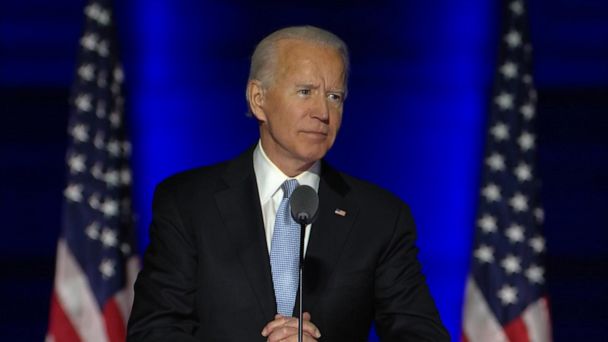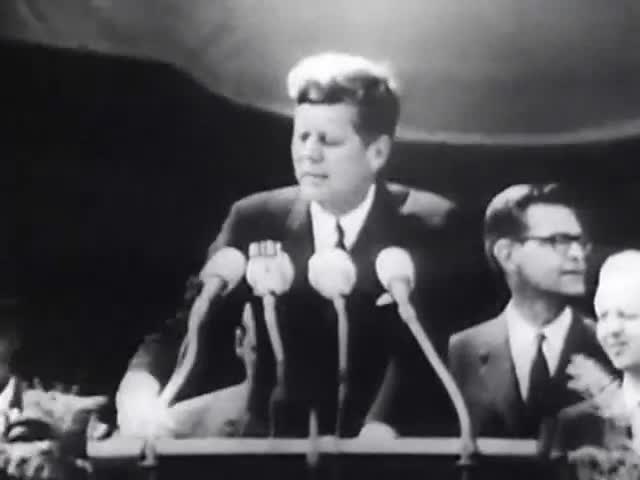
Now, people have differing opinions about the outcome of the election (I think I’ve made it apparent which side I fall on), but I think we can all agree that at least it’s finally over (to the extent that it is). I also think anyone willing to listen with an open heart can acknowledge that, political beliefs notwithstanding, President-elect Joe Biden’s first address Saturday night was moving as hell.
Biden was hardly ad-libbing, of course, and we know he had the assistance of several speechwriters in the assembling of that message. That’s what elected leaders have always done, because some things are too important to say off the cuff, and some things are too important to leave to someone who doesn’t do words for a living.
Not that “does words for a living” is enough. A speechwriter has to really understand the person they’re writing for, to make sure the speech conveys their thoughts, sentiments, and voice — just better. They have to really understand the constituency to know how to phrase things to reach their audience. They have to be fluent without getting overly intellectual, emotional without getting flowery. And they have to be extremely cautious when working in unfamiliar languages.
(Just kidding.)

Ein Berliner 
Also, in a grammatically correct way, ein Berliner
We don’t always know who’s done this important job throughout history. Abraham Lincoln was supposedly responsible for his own speechwriting, but that doesn’t mean there wasn’t actually a, like, Horace Wooster or something (or, just throwing it out there, maybe a Mary Todd Lincoln) contributing to his words. In modern times, though, we are frequently allowed behind the curtain, which means we get to know who’s helping a president sound as eloquent as they do. Here are three of the greats of modern times.
Thomas Sorensen (Kennedy)
Thomas Sorensen was President John F. Kennedy’s speechwriter for 11 years, starting when Kennedy was just Senator Kennedy and working with him all the way up to Kennedy’s death. He was also, for the record, a policy advisor and legal counsel to the president, so while he did contribute to President Kennedy’s policy decisions, it’s not like a mere speechwriter was also weighing in on the Cuban Missile Crisis or something.
But on top of his direct policy influence, Sorensen was conveying those decisions, and the impact thereof, and the reasoning behind them and meaning of them, to the American people in a compelling, meaningful way. Highlights included Kennedy’s 1961 inaugural address and a speech he gave at American University in 1963 on the subject of world peace in the face of war.
From Kennedy’s 1963 speech:
What kind of a peace do I mean? What kind of a peace do we seek? Not a Pax Americana enforced on the world by American weapons of war. Not the peace of the grave or the security of the slave. I am talking about genuine peace, the kind of peace that makes life on earth worth living, the kind that enables men and nations to grow and to hope and build a better life for their children. Not merely peace for Americans, but peace for all men and women. Not merely peace in our time, but peace for all time.
I speak of peace because of the new face of war. Total war makes no sense in an age where great powers can maintain large and relatively invulnerable nuclear forces and refuse to surrender without resort to those forces. It makes no sense in an age where a single nuclear weapon contains almost ten times the explosive force delivered by all the allied air forces in the Second World War. It makes no sense in an age when the deadly poisons produced by a nuclear exchange would be carried by wind and water and soil and seed to the far corners of the globe and a generation yet unborn.
[…]
So let us not be blind to our differences, but let us also direct attention to our common interests and the means by which those differences can be resolved. And if we cannot end now our differences, at least we can help make the world safe for diversity. For in the final analysis, our most basic common link is that we all inhabit this small planet. We all breathe the same air, we all cherish our children’s futures, and we are all mortal.
President John F. Kennedy, address at American University in 1963
Peggy Noonan (Reagan and Bush I)
Peggy Noonan is best known now as a conservative and/or less-conservative commentator on TV, in print, and as author of her own books. But back in The Day, she was a speechwriter for President Ronald Reagan. She was responsible for such speeches as his “Boys of Pointe du Hoc” speech on the anniversary of D-Day in 1984. Four years later, she worked on George H.W. Bush’s presidential campaign, in which she brought us his “a kinder, gentler nation” and contributed to his “thousand points of light.”
Love her or hate her as an opinion writer. the words Noonan put in the mouth of Presidents Reagan and Bush were stirring and compelling. And sometimes, those words were crucial to the hearts of America, as with President Reagan’s address to the nation after the Challenger disaster in 1986.
From Reagan’s 1986 speech:
Nineteen years ago, almost to the day, we lost three astronauts in a terrible accident on the ground. But we’ve never lost an astronaut in flight; we’ve never had a tragedy like this. And perhaps we’ve forgotten the courage it took for the crew of the shuttle; but they, the Challenger Seven, were aware of the dangers, but overcame them and did their jobs brilliantly. We mourn seven heroes: Michael Smith, Dick Scobee, Judith Resnik, Ronald McNair, Ellison Onizuka, Gregory Jarvis, and Christa McAuliffe. We mourn their loss as a nation together.
For the families of the seven, we cannot bear, as you do, the full impact of this tragedy. But we feel the loss, and we’re thinking about you so very much. Your loved ones were daring and brave, and they had that special grace, that special spirit that says, “Give me a challenge and I’ll meet it with joy.” They had a hunger to explore the universe and discover its truths. They wished to serve, and they did. They served all of us.
[…]
And I want to say something to the schoolchildren of America who were watching the live coverage of the shuttle’s takeoff. I know it is hard to understand, but sometimes painful things like this happen. It’s all part of the process of exploration and discovery. It’s all part of taking a chance and expanding man’s horizons. The future doesn’t belong to the fainthearted; it belongs to the brave. The Challenger crew was pulling us into the future, and we’ll continue to follow them.
[…]
The crew of the space shuttle Challenger honored us by the manner in which they lived their lives. We will never forget them, nor the last time we saw them, this morning, as they prepared for their journey and waved goodbye and “slipped the surly bonds of earth” to “touch the face of God.”
President Ronald Reagan, address to the nation following the Challenger disaster in 1986
Jon Favreau (Obama)
Don’t get me wrong — President Barack Obama was eloquent and compelling off the cuff. But when he needed to make absolutely sure he got it right, he turned to Jon Favreau. He first encountered Favreau backstage at the 2004 Democratic National Convention, as then-state Senator Obama was rehearsing his keynote address and Favreau, with the confidence only a 23-year-old deputy speechwriter for candidate John Kerry can have, interrupted him to tell him his address was going to overlap Kerry’s and rewrites were in order.
Favreau joined Obama’s presidential campaign as chief speechwriter in 2006 and soon gained his total trust (Obama described him as his “mind reader”). He was largely responsible for Obama’s 2009 inaugural speech, which he’s said involved weeks of research and was drafted at a Starbucks in Washington. Favreau himself, however, highlights Obama’s 2009 address to the joint session of Congress on healthcare as some of his best work.
From Obama’s 2009 speech:
“What we face,” [Senator Ted Kennedy] wrote [prior to his death], “is above all a moral issue; at stake are not just the details of policy, but fundamental principles of social justice and the character of our country.”
I’ve thought about that phrase quite a bit in recent days — the character of our country. One of the unique and wonderful things about America has always been our self-reliance, our rugged individualism, our fierce defense of freedom and our healthy skepticism of government. And figuring out the appropriate size and role of government has always been a source of rigorous and, yes, sometimes angry debate. That’s our history.
[…]
I understand how difficult this health care debate has been. I know that many in this country are deeply skeptical that government is looking out for them. I understand that the politically safe move would be to kick the can further down the road — to defer reform one more year, or one more election, or one more term.
But that is not what the moment calls for. That’s not what we came here to do. We did not come to fear the future. We came here to shape it. I still believe we can act even when it’s hard. I still believe that we can act when it’s hard. I still believe we can replace acrimony with civility, and gridlock with progress. I still believe we can do great things, and that here and now we will meet history’s test.
Because that’s who we are. That is our calling. That is our character. Thank you, God bless you, and may God bless the United States of America.
President Barack Obama, address to a joint session of Congress on healthcare in 2009
The President’s Speech
As with President Obama above, none of this is to say that these and other presidents are never eloquent in their own right, or that they make no contributions to the speeches written by their speechwriters. But presidents are elected to protect the interests of the American people through flawless policy, not flawless speeches. For a speechwriter to be able to truly know a president, reach into their mind and express their thoughts in a way that they never could — that’s an art. For all that I’ve complained about my copywriting work being characterized as “magic,” it’s tempting for me to see their work precisely that way.
So my apologies to Jon Favreau, Peggy Noon, the late Thomas Sorensen, Vinay Reddy and Carlyn Reichel (both of whom contributed to Biden’s speech above), and others — I promise I do recognize how hard you work at your craft. It’s just easier to see it as The Craft. So go do your magic.

